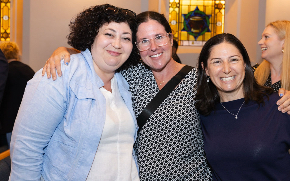Carmina Burana-Sydney Philharmonia Choirs and Orchestra
A music review by Shirley Politzer

Photo: Shirley Politzer
Covid was responsible for many things, including stopping us from enjoying live entertainment. In 2020, Elena Kats-Chernin, a Russian immigrant during the 1970s, had written a work called Human Waves, commissioned and named by Sydney Philharmonic Choirs artistic and music director Brett Weymark.
It should have premiered that year as part of the 100 Minutes of New Music 2020 commission but instead, the choir were rehearsing it online and did a Zoom performance. The big day of their live premiere finally arrived at the Sydney Opera House to a capacity audience this week, but without its composer, who was in Berlin at a premiere of one of her operas. That did not stop Weymark, who has a great sense of humour. While chatting to the librettist Tamara-Anna Cislowska, he casually got Elena up on the iPad in front of the audience, showed her face on the screen, to everyone’s delight, and proceeded to put the iPad on the music stand by the side of the stage so she could enjoy the premiere of her work.

Elena Kats-Chernin
Human Waves is a celebration of the waves of migrants to Australia, something Kats-Chernin can relate to. Weymark commented that this piece, with English words, could expand further as the migrant story continues. The piece is currently in nine movements, each one telling a particular story of the migrant experience. The 1st movement is about the pledge of citizenship as amended by Paul Keating in 1994; then in other movements there are stories including that of a Vietnamese family going across dangerous seas in dodgy boats, Lebanese brothers arriving in 1965 who worked in a factory, then bought taxi licences and thrived in that business and there is a short ode honouring the “Salty Paste”-Vegemite. Each movement reflected a different mood, including Latin rhythms, reflective and slow tunes, and bright, hopeful, energetic music. The orchestration was very interesting to listen to, often pretty, with lovely use of tuned and untuned percussive sounds and harmonies-music one can listen to and enjoy easily. The libretto by Cislowska, who also performed on the piano for this piece, wrote the stories very well but the words were not heard clearly over the orchestra at all times. Congratulations to Elena and Tamara-Anna on an important and well-written work.
The world premiere performance of Murrgumurrgu (Ibis) started with dramatic vocal hissing sounds and long notes followed by a short series of verses in the style of a traditional Aboriginal songline (replica) to display to new audiences the possibilities of reviving other traditional songlines that have almost been forgotten. The music was very melodic and catchy, with a repetitive bright rhythm that pushed the story along. The strings often took over the melodies of the vocal parts while the choir sang beautiful harmonies in the background.
Again, we were fortunate to have the Aboriginal composer of this piece, James Henry, sing a solo and play woodblock on stage with the orchestra and choir. The work was performed in the Yuwaalaraay language and is a tribute to the Ibis and its migration to Sydney, in the same way Henry’s family also moved their home to Sydney- both the Ibis and Henry’s family had their challenges as a result of those moves. Henry has many talents as a composer of choral, orchestral, theatre and dance music and as a musical director. He is the inaugural participant in the Melbourne Symphony Orchestra’s First Voices program.

Photo: Simon Crossley-Meates
If the title “O Fortuna” sounds familiar, it could be because it has been used for award-winning commercials on TV like Nescafe in the 1980s, Old Spice in the 1970s and more recently, The “Big Ad “for Carlton Draught pale lager and in many movies including Excalibur and Lord of the Rings. It is also the grand opening of Carmina Burana. Its strength and grandeur make it hard to not want to start conducting from one’s seat. The excitement in this music by Carl Orff (1895-1982), which is sung mainly in Latin, continues to the end (nearly an hour later) coming full circle by repeating the whole of O Fortuna. Soloists included Lorina Gore (Soprano), Hadleigh Adams(baritone) and Kanene Breen(tenor) who appeared like an apparition from the side door near the audience, moving onto the stage “dressed as a blackened swan being roasted while recalling it’s earlier glory”. It was very impressive and entertaining. The SPC Festival Chorus was ably expanded with the River City Voices (an auditioned choir from Parramatta), and the Sydney Public Schools Junior Singers (an ensemble of The Arts Unit of the Department of Education) with the addition of Tamara-Anna Cislowska on the piano.
The reward for the magnificence of the music and all its performers was 3½ minutes of clapping, cheering and whooping during a standing ovation. An uplifting, interesting, exciting, emotionally intelligent concert deserved such an ending.







